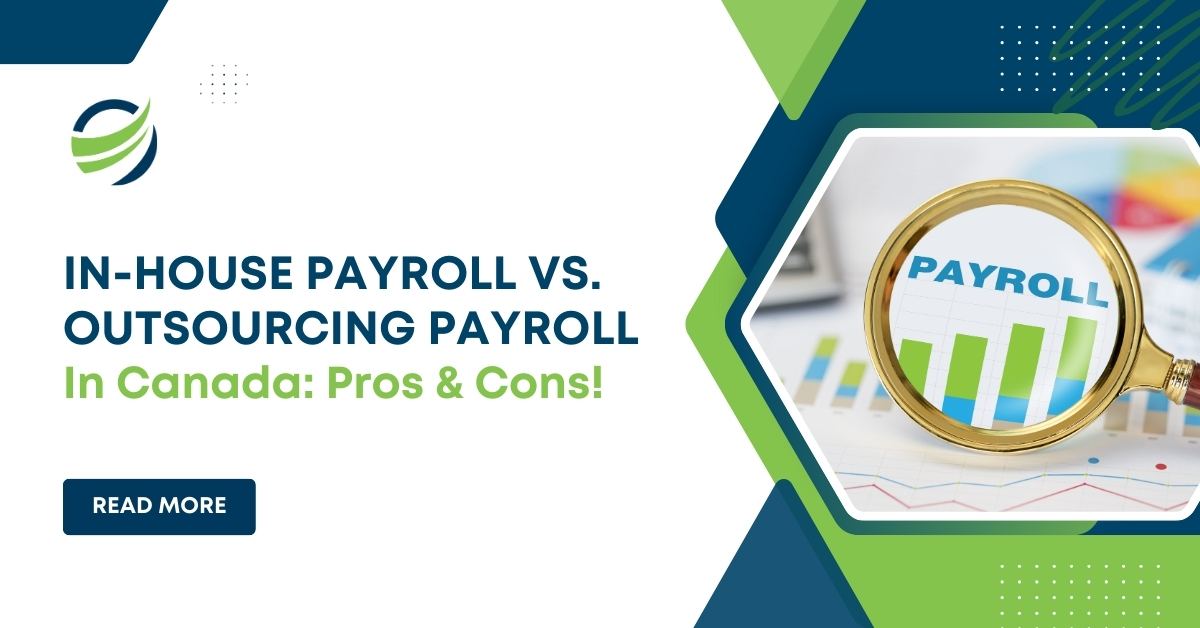In-House Payroll vs. Outsourcing Payroll in Canada: Pros and Cons
Payroll management is an important function for businesses of all sizes. Ensuring employees are paid on time, adhering to tax regulations, and maintaining compliance with ever changing laws is not easy.
For Canadian businesses, deciding between managing payroll in-house or outsourcing it to a third-party provider can be a major decision that impacts operational efficiency, costs, and overall business strategy. For businesses seeking expert support in payroll management, having access to reliable tools and insights can make all the difference.
In this blog, we’ll explore the pros and cons of in-house payroll vs. outsourcing, providing you with the insights you need to make an informed decision for your business.
Understanding What Payroll Management Is?
Before diving into the decision-making process, let’s first understand what payroll management entails.
Payroll management refers to the process of calculating and distributing employee wages, managing tax deductions, ensuring compliance with labor laws, and maintaining accurate records of employee benefits. Efficient payroll process management is key to ensuring compliance with tax regulations while meeting employee needs.
In addition to paying employees, payroll management also includes:
- Pension contributions, income tax deductions, and other statutory deductions.
- Managing benefits for employees, including retirement programs, health insurance, and other incentives.
- Payroll tax filing and submission to federal agencies.
In-House Payroll Processing:
Managing payroll in-house means that your business handles the entire process internally. Typically, an in-house payroll department or a designated payroll manager is responsible for processing payroll, ensuring compliance with tax laws, and managing all payroll-related tasks.
Pros of In-House Payroll Processing:
- Full Control and Flexibility The fact that you have total control over the entire process is one of the key benefits of handling payroll internally. Payroll administration may be instantly modified to meet the unique requirements of your company.
- Enhanced Security Sensitive information such as employee salaries, tax returns, and bank account information stays within the organisation when payroll is handled internally. Knowing that you’re lowering the possibility of data breaches that could happen during outsourcing can provide comfort.
- Closer Integration with Business Greater coordination with other business functions is made possible by in-house payroll. Payroll employees can speak with the finance and HR departments directly to guarantee efficient cooperation and prompt resolution of problems.
Cons of In-House Payroll Processing
- Resource Intensive Dedicated personnel and resources are needed to run payroll internally. Employees that are knowledgeable in accounting, payroll software, and tax laws are essential, and they must also be aware of any changes to the law. Employing, educating, and retaining a payroll staff can be expensive.
- Compliance and Regulation Challenges Due to the complexity and frequent changes in payroll requirements, businesses find it challenging to stay up to date. The Canada Revenue Agency (CRA) may impose expensive fines and penalties for payroll processing errors.
- High Costs There are overhead expenses associated with in-house payroll. The costs of payroll software, employee salaries, audits, and compliance checks are all included in this. These expenses can mount up, particularly for small businesses.
Outsourcing Payroll Processing Services
Hiring a third-party provider to manage all payroll-related activities is known as outsourcing payroll. In order to guarantee accuracy and efficiency, a payroll service provider frequently uses specialised software and cutting-edge technology to manage the processing, calculations, compliance, and filings related to payroll.
Pros of Outsourcing Payroll Services
- Expertise and Accuracy Payroll service providers specialise in payroll processing. This means they are well-versed in current tax regulations, and industry best practices, and are capable of handling complex payroll scenarios. By leveraging outsourced accounting services alongside payroll outsourcing, businesses can minimise the risk of costly payroll errors while ensuring their entire financial management process stays accurate and compliant.
- Cost Efficiency Outsourcing payroll eliminates the need to hire and train an internal payroll team. Additionally, outsourcing reduces the need for expensive payroll software and ensures that your company isn’t burdened with maintaining costly infrastructure.
- Time Savings Outsourcing payroll frees up valuable time for internal resources to focus on more important tasks such as growing the business or managing core operations. The time saved on payroll processing can be saved and used for important projects.
- Outsource Payroll for Small Business For small businesses, outsourcing payroll can be especially beneficial. When paired with outsourced bookkeeping, efficient payroll process management can help them save time, ensure accuracy, and minimise operational costs.
can help them save time and ensure accuracy while minimising operational costs.
Cons of Outsourcing Payroll Processing Services
- Less Control You give up some control over the process when you outsource payroll. Working with an outside source may result in delays or communication problems, even while it can save time and expertise. This could cause delays in payroll processing or difficulties in handling urgent payroll adjustments.
- Security Risks There may be security risks associated with sharing private payroll information with a third-party provider, especially if the outsourcing partner does not have strict data protection policies in place. Selecting a provider with strong cybersecurity procedures is important for reducing the possibility of data breaches.
- Communication Challenges It may become difficult for your business and the payroll provider to communicate, particularly when handling certain problems or last-minute payroll adjustments.
Outsourcing Payroll Pros and Cons
Like every business decision, outsourcing payroll comes with its own set of outsourcing payroll pros and cons. While it offers cost savings, expert management, and time efficiency, it may also result in less direct control over payroll operations and potential security risks.
Outsourcing payroll often complements a company’s bookkeeping strategy, ensuring that financial records are maintained accurately and efficiently. To understand how bookkeeping duties align with payroll, visit our blog on the duties of a bookkeeper.
In-House Payroll vs. Outsourcing: Key Factors to Consider
When choosing between in-house payroll vs. outsourcing, there are several factors to keep in mind:
- Size of the Business Small businesses may find that outsourcing payroll helps them reduce administrative burdens and costs. Larger businesses with complex payroll requirements may benefit from in-house payroll, particularly if they require tailored solutions.
- Complexity of Payroll If your payroll involves multiple locations, diverse employee benefits, or complex tax calculations, outsourcing may provide you with access to specialised expertise and technology. However, businesses with straightforward payroll needs might find in-house payroll more manageable.
- Available Resources Smaller businesses with limited resources may find outsourcing more economical, as it eliminates the need to invest in payroll software, personnel, and training.
- Compliance Considerations Payroll legislation compliance must be guaranteed. Outsourcing allows businesses to benefit from the expertise of providers who specialise in keeping up with changing regulations, minimising the risk of costly compliance errors.
Current Trends in Payroll Outsourcing in Canada
The trend of outsourcing payroll services is on the rise in Canada, with an increasing number of businesses turning to third-party providers for payroll management. According to a research report by Grand View Research, the Canadian payroll outsourcing market is expected to grow significantly, driven by the need for cost savings, compliance, and specialised services.
The market is projected to reach US$46.7 billion by 2030, with a compound annual growth rate (CAGR) of 8.3% from 2025 to 2030.
With the growing trend of payroll outsourcing, small businesses are increasingly recognising the benefits it offers. In fact, research by Mordor Intelligence shows that over 45% of small businesses are opting to outsource payroll services due to the cost-effectiveness and operational efficiency it provides.
The increasing reliance on automated payroll solutions and cloud-based platforms is also contributing to the rise of payroll outsourcing. These platforms provide businesses with real-time updates, enhanced security, and seamless communication with payroll service providers.
Making the Right Choice for Your Business
Both in-house payroll and outsourcing come with their distinct advantages and disadvantages. In-house payroll offers full control and flexibility, but it can be resource-intensive and expensive. On the other hand, outsourcing payroll provides access to expertise and cost savings but involves less control and possible security risks.
The decision between in-house payroll vs. outsourcing largely depends on your business’s size, complexity, and available resources. As the Canadian business landscape continues to change, payroll outsourcing is becoming a popular solution, especially for small businesses looking to simplify their operations.
Ultimately, whether you choose to manage payroll internally or outsource it, the key is ensuring accuracy, compliance, and security. Consulting with outsourcing payroll experts and service providers can help you find the best solution designed for your specific needs.






